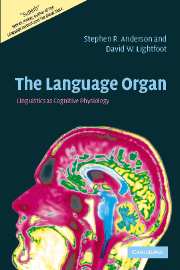Book contents
- Frontmatter
- Contents
- Preface
- 1 Studying the human language faculty
- 2 Language as a mental organ
- 3 Syntax
- 4 Sound patterns in language
- 5 Describing linguistic knowledge
- 6 Phonetics and the I-linguistics of speech
- 7 Morphology
- 8 Language change
- 9 “Growing” a language
- 10 The organic basis of language
- References
- Index
1 - Studying the human language faculty
Published online by Cambridge University Press: 03 December 2009
- Frontmatter
- Contents
- Preface
- 1 Studying the human language faculty
- 2 Language as a mental organ
- 3 Syntax
- 4 Sound patterns in language
- 5 Describing linguistic knowledge
- 6 Phonetics and the I-linguistics of speech
- 7 Morphology
- 8 Language change
- 9 “Growing” a language
- 10 The organic basis of language
- References
- Index
Summary
If you meet someone at a cocktail party and tell them you are a carpenter, or a veterinarian, or an astronomer, they are likely to be quite satisfied with that, and the subsequent evolution of the conversation will depend, at least in part, on the depth of their interest in woodworking, animals, or the universe. But if you tell them you are a linguist, this is unlikely to satisfy whatever curiosity they may have about you: “Oh, so how many languages can you speak?” is the most common reply at this point. But in fact, many – probably even most – linguists actually speak few if any languages in addition to their native tongue, in any practical sense. A “linguist,” at least in academic disciplinary terms, is not a person who speaks many languages, but rather someone concerned with the scientific study of language more generally.
That still doesn't settle matters, though. As we will discuss below, different generations of scholars have had rather different notions of what was important enough about language to warrant study. Languages have histories, and relationships with one another that at least superficially parallel genetic connections, and one can study those things. Most often, languages are spoken, and it is possible to study the anatomical, acoustic, and perceptual aspects of speech. Different spoken forms can mean different things, and we might study the kinds of things we can “mean” and the ways differences in the forms of words are related to differences in their meanings.
- Type
- Chapter
- Information
- The Language OrganLinguistics as Cognitive Physiology, pp. 1 - 17Publisher: Cambridge University PressPrint publication year: 2002



